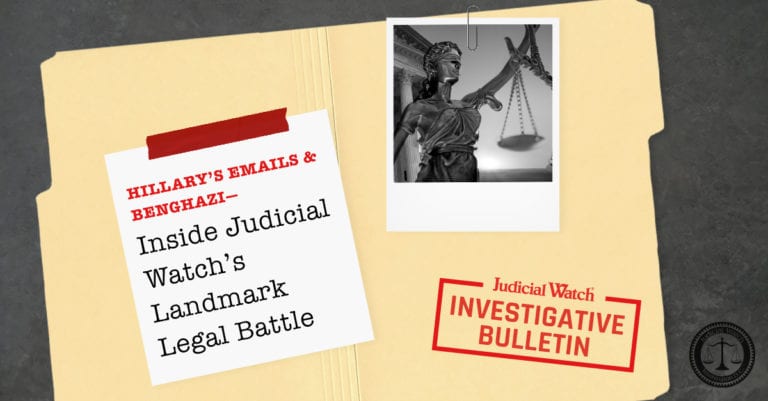
Hillary’s Emails & Benghazi—Inside Judicial Watch’s Landmark Legal Battle

Life continues to unfold, even in the midst of the coronavirus pandemic. That includes—flying mostly under the media and legal radar—the most consequential freedom of information battle in a generation: Judicial Watch’s long fight for records related to Hillary Clinton’s emails and the Benghazi affair. In a landmark ruling earlier this month, U.S. District Court Judge Royce Lamberth granted Judicial Watch’s request to depose Mrs. Clinton in the case. Mrs. Clinton is directed to appear under oath and answer questions from Judicial Watch attorneys.
It’s a big case. Lamberth called the issues in the lawsuit “one of the gravest modern offenses to government transparency.”
That was Lamberth in a 2018 ruling, four years after Judicial Watch first filed a lawsuit in the case. The Lamberth memorandum is a fierce defense of the Freedom of Information Act that should be required reading for every law school FOIA seminar. It details the government’s “outrageous misconduct” in the case and notes President Obama himself defended FOIA as “the most prominent expression of a profound national commitment to ensuring an open government.” The ruling outlined the discovery Judicial Watch would be permitted to take in the case.
The heart of the matter, Lamberth wrote in 2018, is that “faced with one of the gravest modern offenses to government transparency, [Obama’s] State and Justice Departments fell far short. Did Hillary Clinton use her private email as Secretary of State to thwart [FOIA]? Was the State Department’s attempt to settle [a Judicial Watch] FOIA case in 2014 an effort to avoid searching—and disclosing the existence of—Clinton’s missing emails? And has State ever adequately searched for records in the case?”
But government foot-dragging and stonewalling continued. Meanwhile, Judicial Watch discovered new emails (read about it here and here) and Mrs. Clinton’s written responses proved insufficient to answer the questions raised by the court and in discovery. Earlier this month—nearly six years after the case commenced—Lamberth’s patience finally ran out. “The court agrees with Judicial Watch,” he wrote, “it is time to hear directly from Mrs. Clinton.”
Lamberth’s 2020 order is stinging and concise. The State Department wants the matter closed and the Justice Department supports that position. “But there is still more to learn,” Lamberth notes. “Even though many important questions remain unanswered, the Justice Department inexplicably takes the position that the court should close discovery and rule on dispositive motions. The court is especially troubled by this. To argue that the court now has enough information to determine whether State conducted an adequate search is preposterous, especially when considering State’s deficient representations regarding the existence of additional emails.”
Lamberth noted earlier decisions that high-ranking government officials should not be dragged into court to account for official actions unless there were “extraordinary circumstances.” But the Judicial Watch case clears that bar, he ruled.
“The Court has considered the numerous times in which Secretary Clinton said she could not recall or remember certain details in her prior interrogatory answers,” Lamberth wrote. “In a deposition, it is more likely that plaintiff’s counsel could use documents and other testimony to refresh her recollection. And so, to avoid the unsatisfying and inefficient outcome of multiple rounds of fruitless interrogatories and move this almost six-year-old case to its conclusion, Judicial Watch will be permitted to clarify and further explore Secretary Clinton’s answers in person and immediately after she gives them.”
What did Secretary Clinton know about her private email server, FOIA, and Benghazi communications, and when did she know it? Lamberth spells out some of the key questions.
“For example,” Lamberth writes, “how did she arrive at her belief that her private emails would be preserved by normal State Department processes for email retention? Who told her that—if anyone—and when? Did she realize State was giving a ‘no records’ response to FOIA requests for her emails? If so, did she suspect that she had any obligation to disclose the existence of her private server to those at State handling the FOIA requests? When did she learn that State’s records management employees were unaware of the existence of her private server? And why did she think that using a private server to conduct State Department business was permissible under the law in the first place? Again, who told her that—if anyone—and when?”
Mrs. Clinton’s legal team has fired back with an 83-page petition to the U.S. Court of Appeals asking it to throw out Judge Lamberth’s order. The deposition order is “inappropriate, unnecessary, and a clear abuse of discretion,” the Clinton lawyers wrote.
But of course the real abuse here is a six-year stonewall and an assault on the Freedom of Information Act. Corrupt and secretive players throw roadblocks, stonewalls and legal obstacles in the way of transparency, accountability and reform. Bad actors drown the opposition in delays and expensive legal actions. It is instructive that this fight has taken six years. Most individuals and organizations do not have the money and legal firepower to fight the government for months or years, so the government wins. The critical message in the Lamberth rulings is that FOIA, an essential tool in holding the powerful to account, is under siege. Let’s hope the Court of Appeals recognizes that the real fight here is about transparency and accountability, and allows the deposition of Hillary Clinton to proceed.
***
Micah Morrison is chief investigative reporter for Judicial Watch. Follow him on Twitter @micah_morrison. Tips: mmorrison@judicialwatch.org
Investigative Bulletin is published by Judicial Watch. Reprints and media inquiries: jfarrell@judicialwatch.org
















